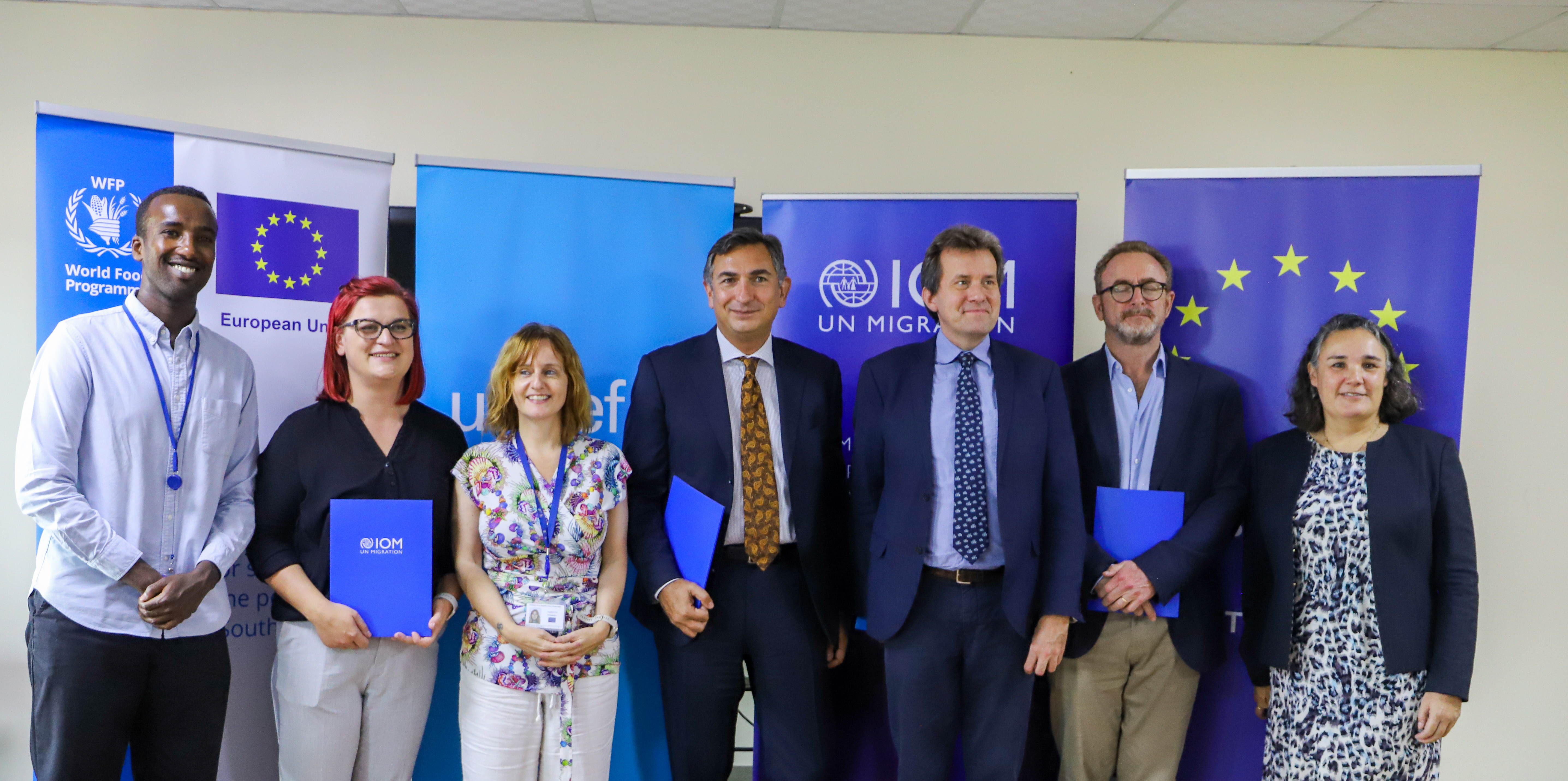-
Who We Are
WHO WE AREThe International Organization for Migration (IOM) is part of the United Nations System as the leading inter-governmental organization promoting since 1951 humane and orderly migration for the benefit of all, with 175 member states and a presence in over 100 countries. IOM has had a presence in South Sudan since 2011.
About
About
IOM Global
IOM Global
-
Our Work
Our WorkAs the leading inter-governmental organization promoting humane and orderly migration, IOM plays a key role to support the achievement of the 2030 Agenda through different areas of intervention that connect both humanitarian assistance and sustainable development. IOM South Sudan provides a comprehensive response to the humanitarian needs of migrants, internally displaced persons, returnees and host communities.
Cross-cutting (Global)
Cross-cutting (Global)
- Data and Resources
- Take Action
- 2030 Agenda
UN Agencies, EU Delegation Launch Project to Promote Education, Livelihoods, and Community Cohesion
JUBA – Three UN agencies and the European Union (EU) Delegation to South Sudan at a signing ceremony in Juba today launched a new programme to strengthen education, resilience and social cohesion in areas affected by displacement and returns.
The International Organization for Migration (IOM), the World Food Programme (WFP) and the United Nations Children's Fund (UNICEF) project with financial support from the EU, dubbed as “Strengthened Access to Education and Livelihoods and Enhanced Reintegration and Community Cohesion in Areas Affected by Displacement and Returns,” will support more than 120,000 people in areas impacted by conflict.
“South Sudanese are strong and resilient people who have gone through repeated cycles of deprivation, hardship, and violence. With this additional programme, the EU Delegation reaffirms its commitment to enhance the resilience of vulnerable populations in South Sudan,” said Gabriel Leonte, Head of Cooperation at the EU Delegation “This new programme with a strong focus on education, builds resilience from the ground up through a multisectoral and area-based approach. It targets girls, boys, women and men, families, communities, and the wider system and offers a wide range of services and activities that will help them build more sustainable and resilient lives.”
There are more than two million people displaced in South Sudan and after years of conflict and unrest, some displaced families are starting to return to their original homes. However, new conflict in some areas, underdevelopment, climate-related shocks, hyperinflation, and unemployment have eroded livelihoods and coping strategies and precluded communities from fully recovering from effects of war.
To foster cohesion between communities, displaced people, and returnees, and to mitigate the impacts of lost livelihoods and infrastructure, the joint project will support people with a range of initiatives including education, livelihoods, school feeding, climate resilience, and activities to promote social cohesion.
“I am very excited about this project as it is a part of a longer-term development effort. The project is taking an integrated multi-sectoral support focusing on displaced populations and host communities. It provides them with a solid basis for independence and resilience. To unlock South Sudan’s full potential and to give its people a chance to a dignified existence, we need to move from humanitarian assistance to development in all parts of the country where this is possible,” said Kristina Uzelac, IOM South Sudan Head of Operations.

Approximately 2.8 million children are out of school in the country impacting their psychological distress and vulnerability to violence, abuse, neglect, and exploitation. The programme supports increasing access to inclusive and gender-responsive quality basic education in both the formal and non-formal sectors. It contributes to improving retention, learning outcomes, girls’ education, gender equality and peacebuilding.
“Education is a critical component in transforming the lives of children and building resilience in communities. This programme will provide the much-needed attention to education in the effort to alleviate the multiple challenges displaced persons face at time of re-integration. Access to education is the cornerstone of a bright future for the children of South Sudan,” said Jesper Moller, Deputy Representative, UNICEF South Sudan.
Meanwhile, displaced persons who return to their homes and host communities in areas affected by conflict and climate impacts such as flooding frequently face multiple challenges including the lack of access to services such as education, livelihoods opportunities and face ongoing food insecurity.
“Families affected by conflict and extreme weather have lost their livelihoods and have no means to support themselves or to feed their children,” said Adeyinka Badejo, Acting Country Director for WFP in South Sudan. “This project will provide children from both returnee and host communities with daily nutritious school meals which relieves parents from having to budget for lunches and encourages greater enrolment and retention of children in schools.”
The components of the programme have been designed to be meaningfully interconnected. The programme provides an integrated package of education, child-protection, and nutrition interventions, including feeding in schools that will support children to learn, whilst also enabling adults to obtain numeracy, literacy, and life skills essential to strengthen their prospects for sustainable livelihoods and income generation.
For more information, please contact:
Nabie Loyce | IOM South Sudan | Tel: +211 9123 80115| nloyce@iom.int
Richard Ruati | UNICEF South Sudan| rruati@unicef.org
Gemma Snowdon | WFP South Sudan | +211 92 543 0085 | gemma.snowdon@wfp.org
